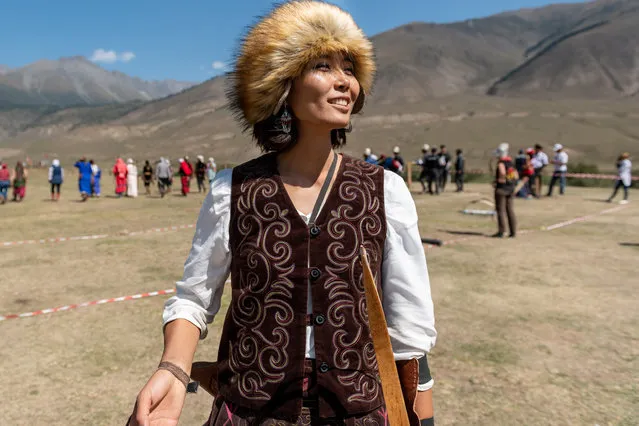
This year’s World Nomad Games, a celebration of nomadic heritage, took place in the Issyk-Kul province of Kyrgyzstan. Eleanor Moseman photographed female competitors who had travelled from all over central Asia and eastern Europe, and explored the difficulties and challenges they face as competitors. Here: Eliza Tynalieva from Kyrgyzstan places second in the women’s traditional archery, Hungarian-style. Tynalieva has only been pursuing the sport professionally for two years, and qualified this spring for the World Nomad Games with no experience in any traditional style. She is inspired by her grandfather, a veteran of the second world war, who performed tricks on horseback and acrobatics. Her parents were supportive of her sports activities, which included basketball and soccer. She has two children and a supportive husband, which makes the pursuit of her passion and sport easier. (Photo by Eleanor Moseman/The Guardian)
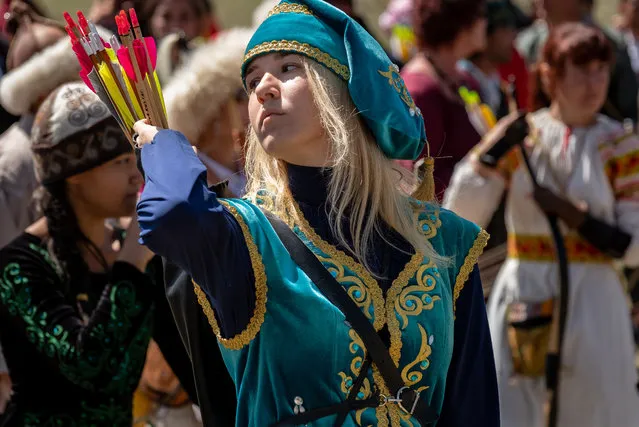
Katerina Chernova from Russia pulls an arrow as she stands in line to compete in the traditional archery competition, where she will place second for the Turkish style. Katerina has been practicing archery for three years and this is her first international competition. She feels that archery gives her skills that can’t be easily achieved in normal day activities, such as concentration and controlling emotions. (Photo by Eleanor Moseman/The Guardian)
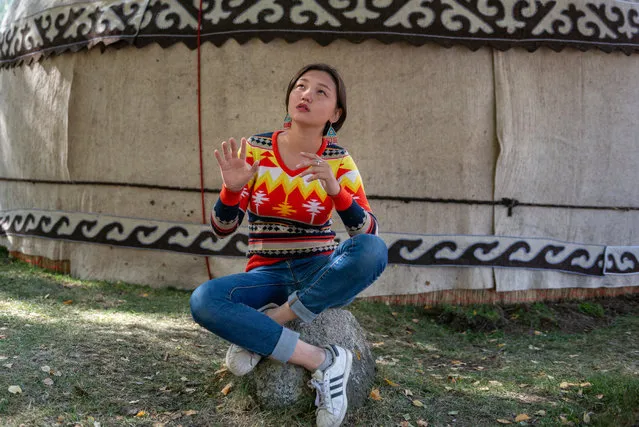
Baktygul Rakymbaeva, 16, is one of few women or girls who can recite the Epic of Manas, a poem dating back to the 18th century that consists of approximately 500,000 lines and tells the history and events of the Kyrgyzstan region. She began learning it at the age of four but stopped because she was repeatedly told it was inappropriate for a woman to be reciting the Manas. She started again when she was 12 and began to win competitions, which brought support from her family and friends. (Photo by Eleanor Moseman/The Guardian)
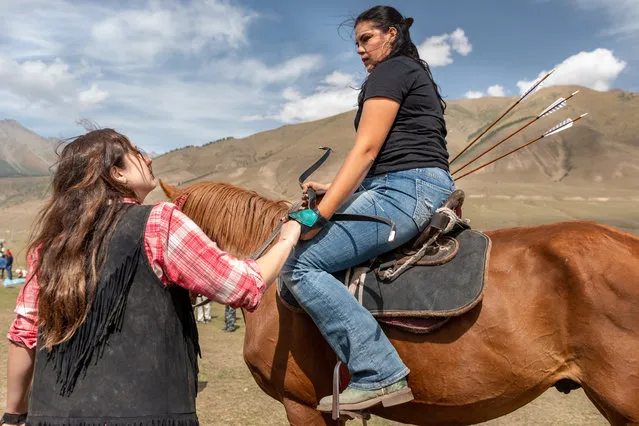
Serena Caballero receives support from her teammate Susannah Winfield before competing in the final rounds of mounted archery, where she will place third. Despite the competitive nature of these sports, the women are very supportive to one another; many say the best thing about competing is meeting people from all over the world, learning about other cultures, and new friends. (Photo by Eleanor Moseman/The Guardian)
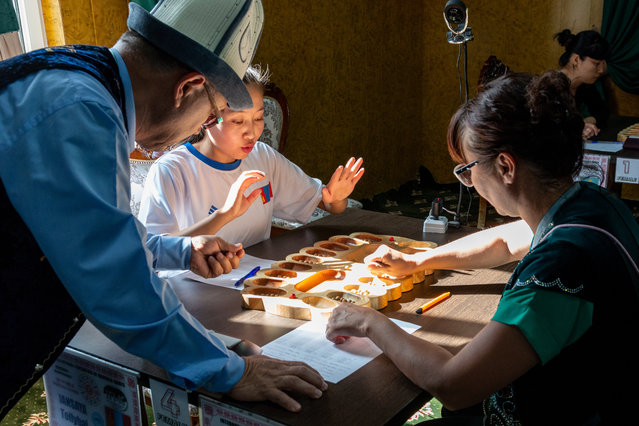
Aizhanat Okasheva from the Altai region of Russia competes in a game of toguz kumalak with Jansaya Toilybai. Okasheva began as a chess player, and started playing toguz kumalak just a few years ago while teaching German. Nearly as many women as men compete in toguz kumalak, an intellectual game rather than a physical sport, although the rules say men and women can’t compete with each other. This could be a result of it's history of development in a Muslim region. (Photo by Eleanor Moseman/The Guardian)
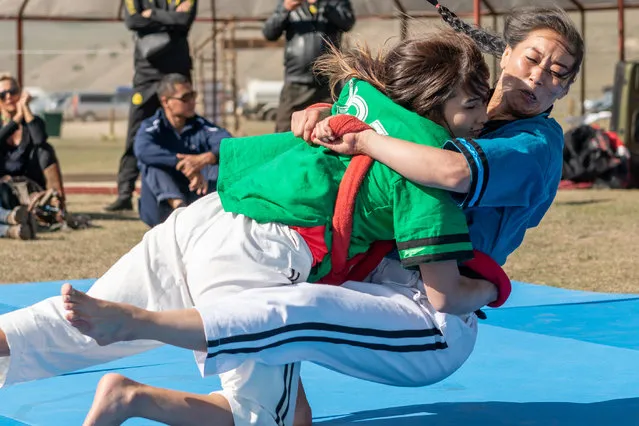
Meerim Momunova wrestles with her fellow Kyrgyz teammate Anara Ryskulova during a performance of a traditional style of wrestling called “Alysh”. Momunova is a champion in Asia and has been competing since 2015, after a background in judo. According to Momunova, one of the advantages of “Alysh” is the ease of the uniform for women – even Muslim women who cover their faces can compete. Momunova holds a degree in sports coaching and hopes to see more women come into this sport. (Photo by Eleanor Moseman/The Guardian)
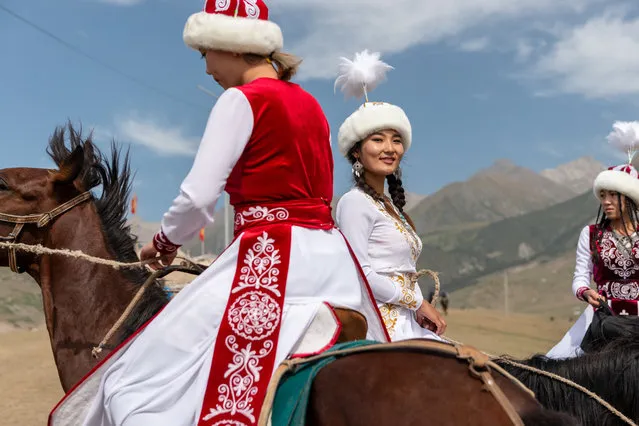
A group of Kyrgyz female stunt riders take some time out from the games to ride together and talk. Their performance consists of men chasing them for a kiss, as if the men are “bride-kidnapping”. But the tradition is mocked when the women return the chase, catching up to the kiss thief and whipping him. This was performed numerous times during the World Nomad Games and would bring the audience to roaring laughter. (Photo by Eleanor Moseman/The Guardian)
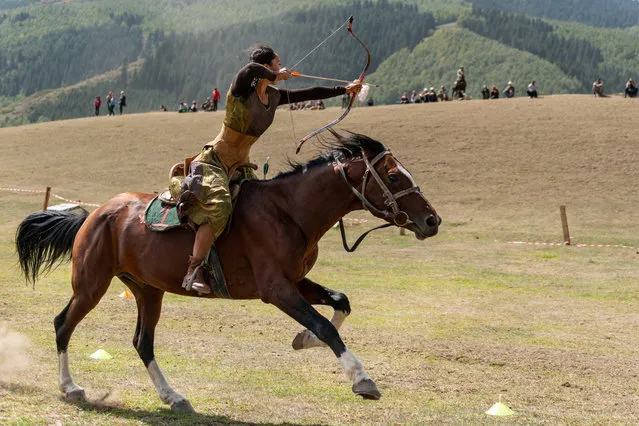
Aida Akhmatova from Kyrgyzstan fires at three targets along a 120-metre track before placing second for the women’s division of mounted archery. To make the competition fair, none of the athletes are familiar or accustomed to their horse, and the women must alternate the horses among them. Not only are they up against the challenge of hitting their targets, but also controlling their horse. (Photo by Eleanor Moseman/The Guardian)
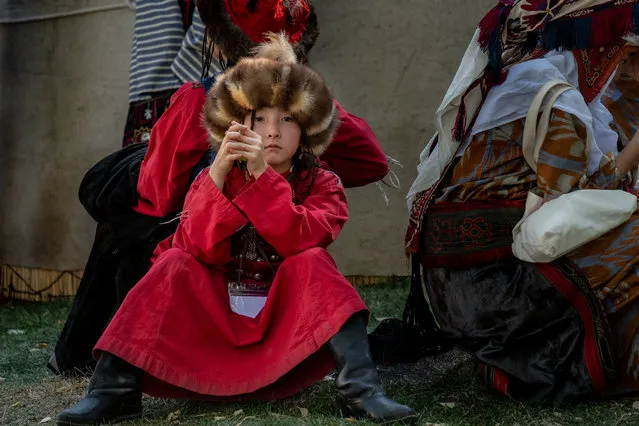
A young Kyrgyz girl wearing traditional dress watches over the activities and spectators at the World Nomad Games. (Photo by Eleanor Moseman/The Guardian)
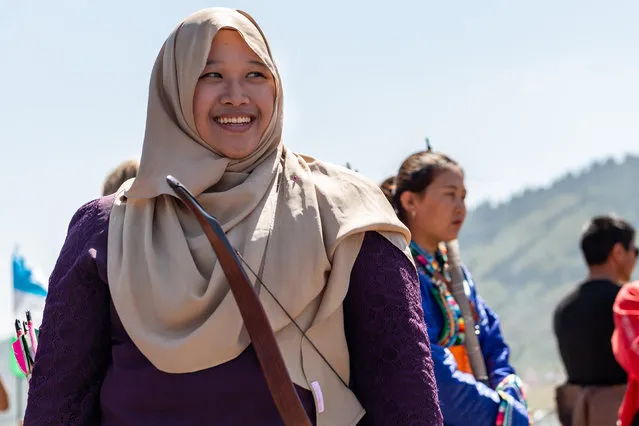
Saleha Rashidi from Singapore is competing in archery for the first time internationally at the World Nomad Games. She thinks the sport allows women to be equally competitive with her male counterparts, and doesn’t think it a bad idea to compete against them. Saleha says archery has also given her strength and focus within her spirituality. The emphasis on discipline, inner strength, consciousness, unity and harmony with nature resonate with her and the archery community. (Photo by Eleanor Moseman/The Guardian)
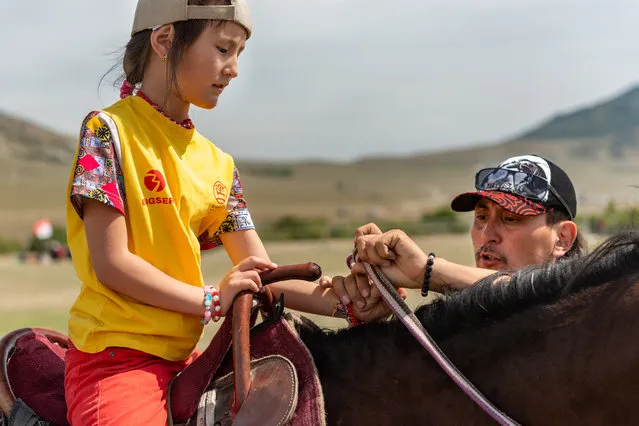
Ellana, eight, is coached by her father, Kostumov Farhat, on how to hold the reins to control her horse. Both her parents compete in the sport of archery – they say it’s a great way for the family to be together and support one another. Ellana tells all her classmates and friends about her love for the sport and horses, which has inspired other young girls to become interested. (Photo by Eleanor Moseman/The Guardian)
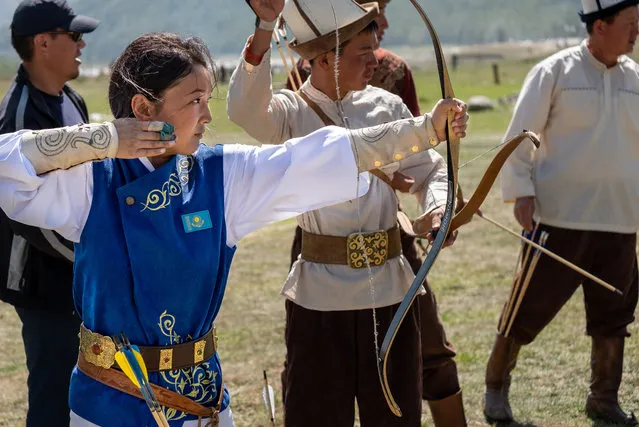
Aliya Kamalova from Kazakhstan practises with men before the finals of horse-mounted archery. At 21, she’s been doing the sport for two years; the first year was just learning how to ride a horse. In the beginning people told her it wasn’t a sport for women, but she pursued it because she feels it is a part of the Kazakh blood. (Photo by Eleanor Moseman/The Guardian)
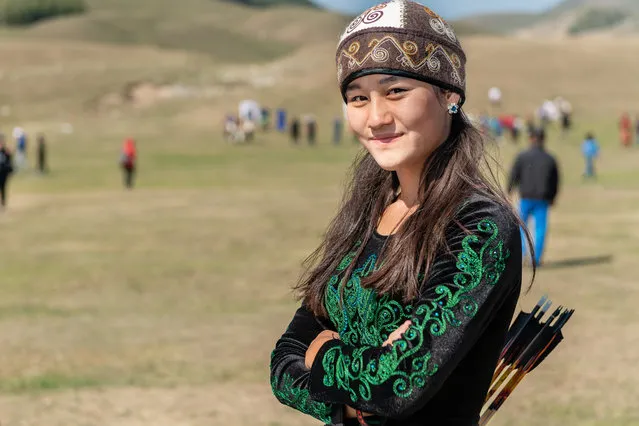
Ayana Rustam, 16, from Kyrgyzstan, is the youngest female archer at the World Nomad Games. This is her first competition, and she was drawn into the sport by simple curiosity. She says a challenge she faces as a woman is that there are different thoughts that come to her head, and she must learn to overcome those to win. After high school, she plans to pursue studies in law to “defend others and fight for justice”. (Photo by Eleanor Moseman/The Guardian)
20 Sep 2018 00:05:00,
post received
0 comments
